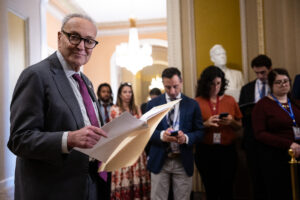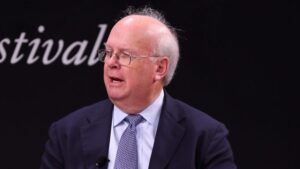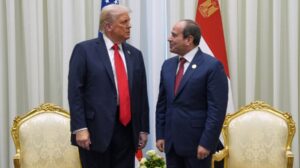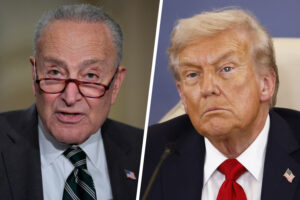The Dictatorship
MIT president says she ‘cannot support’ proposal to adopt Trump priorities for funding benefits

WASHINGTON (AP) — The president of the Massachusetts Institute of Technology said Friday she “cannot support” a White House proposal that asks MIT and eight other universities to adopt President Donald Trump’s political agenda in exchange for favorable access to federal funding.
MIT is among the first to express forceful views either in favor of or against an agreement the White House billed as providing “multiple positive benefits,” including “substantial and meaningful federal grants.” Leaders of the University of Texas system said they were honored its flagship university in Austin was invited, but most other campuses have remained silent as they review the document.
In a letter to Trump administration officials, MIT President Sally Kornbluth said MIT disagrees with provisions of the proposal, including some that would limit free speech and the university’s independence. She said it’s inconsistent with MIT’s belief that scientific funding should be based on merit alone.
“Therefore, with respect, we cannot support the proposed approach to addressing the issues facing higher education,” Kornbluth said in a letter to Education Secretary Linda McMahon and White House officials.

FILE – Massachusetts Institute of Technology (MIT) President Sally Kornbluth speaks during a hearing of the House Committee on Education on Capitol Hill, Dec. 5, 2023, in Washington. Kornbluth has suspended a student group that has held demonstrations against Israel’s military campaign in Gaza as protest over the war continue to rattle universities around the country. In a video statement Tuesday, Feb. 13, 2024, Kornbluth said the group, Coalition Against Apartheid, held a demonstration Monday night without going through the permission process that all groups are required to do. (AP Photo/Mark Schiefelbein, File)
FILE – Massachusetts Institute of Technology (MIT) President Sally Kornbluth speaks during a hearing of the House Committee on Education on Capitol Hill, Dec. 5, 2023, in Washington. Kornbluth has suspended a student group that has held demonstrations against Israel’s military campaign in Gaza as protest over the war continue to rattle universities around the country. In a video statement Tuesday, Feb. 13, 2024, Kornbluth said the group, Coalition Against Apartheid, held a demonstration Monday night without going through the permission process that all groups are required to do. (AP Photo/Mark Schiefelbein, File)
The higher education compact circulated last week requires universities to make a wide range of commitments in line with Trump’s political agenda on topics from admissions and women’s sports to free speech and student discipline. The universities were invited to provide “limited, targeted feedback” by Oct. 20 and make a decision no later than Nov. 21.
Others that received the 10-page proposal are: Vanderbilt, the University of Pennsylvania, Dartmouth College, the University of Southern California, the University of Arizona, Brown University and the University of Virginia. It was not clear how the schools were selected or why.
Colleges have faced mounting pressure to reject the proposal
University leaders face immense pressure to reject the compact amid opposition from students, faculty, free speech advocates and higher education groups. Leaders of some other universities have called it extortion. The mayor and city council in Tucson, home of the University of Arizona, formally opposed the compact, calling it an “unacceptable act of federal interference.”
Even some conservatives have dismissed the compact as a bad approach. Frederick Hess, director of education policy at the American Enterprise Institute, called it “profoundly problematic” and said the government’s requests are “ungrounded in law.”
At the University of Virginia, officials invited campus feedback on the proposal this week. A message from university leaders said it would be “very difficult” to accept certain terms of the arrangement and said the decision will be guided by “principles of academic freedom and free inquiry.”
Democrats in the Virginia Senate threatened to cut the university’s funding if it signed the deal. In a letter to the university’s leaders on Tuesday, top Democrats called the compact a trap and said the state would not “subsidize an institution that has ceded its independence to federal political control.”
California Gov. Gavin Newsom, a Democrat, issued a similar ultimatum to USC last week.
At Brown, which already struck an agreement with the White House in July to resolve a series of investigations, university president Christina H. Paxson said Friday she is seeking campus input to decide how or whether to respond to the new proposal.
The compact marks a new tactic to seek reforms
In its letter to universities, the administration said the compact would strengthen and renew the “mutually beneficial relationship” between universities and the government. That bond faces unprecedented strain as the White House cuts billions of dollars in research funding from campuses it accuses of antisemitism and liberal bias.
The compact is a proactive attempt at reform even as the government continues enforcement through other means, the letter said. The nine universities were invited to become “initial signatories.”
Kornbluth’s letter did not explicitly decline the compact but suggested that its terms are unworkable. Still, she said MIT is already aligned with some of the values outlined in the deal, including prioritizing merit in admissions and making college more affordable.
Kornbluth said MIT was the first to reinstate requirements for standardized admissions tests after the COVID-19 pandemic and admits students based on their talent, ideas and hard work. Incoming undergraduates whose families earn less than $200,000 a year pay nothing for tuition, she added.
“We freely choose these values because they’re right, and we live by them because they support our mission,” Kornbluth wrote.
As part of the compact, the White House asked universities to freeze tuition for U.S. students for five years. Those with endowments exceeding $2 million per undergraduate could not charge tuition at all for students pursuing “hard science” programs.
It asked colleges to require the SAT or ACT for all undergraduate applicants and to eliminate race, sex and other characteristics from admissions decisions. Schools that sign on would also have to accept the government’s binary definition of gender and apply it to campus bathrooms and sports teams.
Much of the compact centers on promoting conservative viewpoints. To make campuses a “vibrant marketplace of ideas” campuses would commit to taking steps including “transforming or abolishing institutional units that purposefully punish, belittle, and even spark violence against conservative ideas.”
___
The Associated Press’ education coverage receives financial support from multiple private foundations. AP is solely responsible for all content. Find AP’s standards for working with philanthropies, a list of supporters and funded coverage areas at AP.org.
The Dictatorship
The two words Democrats are avoiding in praising the Israel-Hamas peace deal
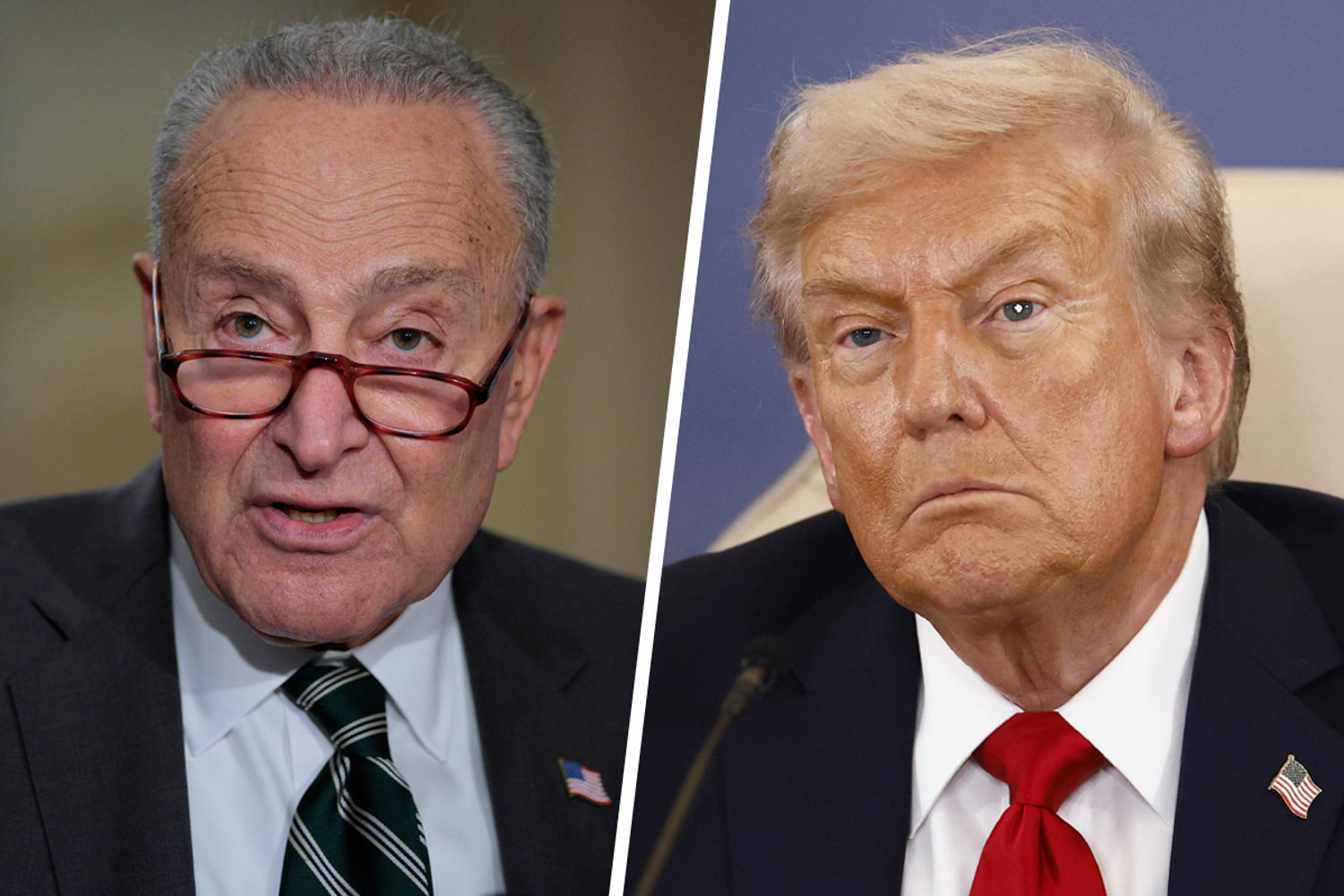
Democrats are heaping praise on the peace deal struck between Israel and Hamas, which unlocked the release of all living hostages in Gaza. But there are two words most Democrats are omitting when discussing the peace agreement: “Donald” and “Trump.”
In statement after statement, Democrats on Capitol Hill lauded the end to the fighting, the liberation of hostages and the hope of a new chapter in the Middle East, applauding “all involved in succeeding to broker the ceasefire agreement” and touting the “power of diplomacy” for getting the globe to that moment.
“After two years of abduction and torture, every living hostage is finally home. Those who were taken on October 7th will outlast the terrorist organization that tore them from their families and homes and unleashed a war of untold suffering,” Rep. Ritchie Torres, D-N.Y., wrote on social media. “Against all odds, the timeless call to ‘Let My People Go’ has been answered.”
Notably, however, there was no mention of Trump.
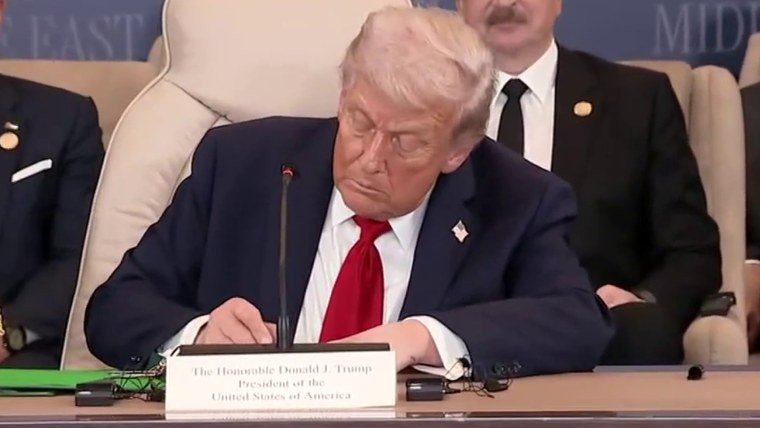
The same could be said for Minority Leader Hakeem Jeffries, D-N.Y.
Jeffries called the agreement “an extremely welcome development.”
“The world will be a better place with a safe and secure Israel living side by side in peace and prosperity with the Palestinian people able to achieve the dignity and self-determination they deserve. We must all recommit to achieve that outcome,” Jeffries said.
Senate Minority Leader Chuck Schumer, D-N.Y., eventually gave Trump a shout-out Monday afternoon, after ignoring the president’s role when the deal was first announced.
In a 175-word statement, Schumer commended “the enormous advocacy of the tireless hostage families, President Trump, his administration, and all who helped make this moment happen.”
While he didn’t necessarily avoid Trump, he was careful to bookend his praise within a statement that celebrated the living hostages coming home and a call to build a lasting peace in the region.
And the ranking Democrat on the House Foreign Affairs Committee, Rep. Gregory Meeks, D-N.Y., posted on X that he was “deeply relieved to see the living hostages released from Gaza today.”
“May their freedom mark a process of healing for them and their families, and the beginning of a durable peace for both Israelis and Palestinians,” Meeks said.
There was no mention of Trump.
The divide between celebrating the deal while ignoring the man who helped broker it highlights the politically tricky terrain Democrats find themselves in. They want to laud the potentially historic peace agreement without giving credit to Trump, a figure they and their voters largely loathe and whose actions throughout the war have drawn criticism.
It’s the latest flashpoint in the long-simmering debate within the Democratic Party over Israel, which has pitted pro-Israel Democrats against progressive lawmakers who sharply criticized the treatment of Palestinians in Gaza — a discourse that has played out publicly.
Republicans, for their part, are taking note of the lopsided reaction. On Monday, Speaker Mike Johnson, R-La., criticized Democrats for not explicitly giving Trump “any credit,” accusing them of being fearful of the blowback from their base.
“They’re afraid, again, as I said in the press conference, of their Marxist base,” Johnson told reporters. “They’re afraid of the radical left, the growing number of radical leftists in the Democrat Party who will attack them if they say anything positive or affirmative about President Trump and his work, and it is a great shame and a great danger to the country.”
The speaker noted that he was “heartened” by the comments of some Democrats, including former Secretary of State Hillary Clinton — Trump’s rival from the 2016 election. In an appearance Friday on CBS News, Clinton said, “I really commend President Trump and his administration, as well as Arab leaders in the region for making the commitment to the 20-point plan and seeing a path forward for what’s often called the day after.”
Of course, some congressional Democrats have joined Clinton in calling out the president.
Sen. Jon Ossoff — who faces a tough re-election next year in Georgia — praised the White House. “I commend the efforts of the Trump Administration and international partners to achieve this moment and will vigorously support the hard work ahead necessary to secure peace, security, and freedom for all people in the Middle East,” he wrote in a statement.

In a post on social media, Rep. Jared Moskowitz, D-Fla., called it an “amazing day for the families” of returned hostages. “And for @POTUS and all the negotiators who made this day possible,” he said.
Sen. John Fetterman, D-Pa., a vocal supporter of Israel, also congratulated Trump the day he announced the peace deal.
And asked during a Sunday appearance on BLN how much credit Trump deserves for the deal, Sen. Mark Kelly, D-Ariz., said Trump “should get a lot of credit.”
“This was his deal,” Kelly added. “He worked this out.”
Of course, Trump has played into the stewing domestic political divide over the situation in the Middle East, criticizing his Democratic predecessors as recently as Monday during his speech before the Knesset.
“All of the countries in the Middle East could have — what we’re doing now — it could have happened a long time ago, but it was strangled and set back, almost irretrievably by the administrations of Barack Obama and then Joe Biden,” Trump said in his hour-plus remarks.
Kevin Frey is a congressional reporter for BLN. He previously served as Washington correspondent for Spectrum News NY1. A graduate of George Washington University, he grew up in Pennsylvania. When he isn’t roaming the halls of Congress, you’ll find Kevin singing with a local choir.
Mychael Schnell is a congressional reporter at BLN, where she covers all happenings on Capitol Hill involving both Democrats and Republicans. She previously covered Congress at Blue Light News. She graduated from George Washington University’s School of Media and Public Affairs with a bachelor’s degree in journalism and mass communication and political science. She is a native New Yorker, Billy Joel’s No. 1fan and a Rubik’s Cube aficionado.
The Dictatorship
Washington state waters down child abuse law after pressure from Trump administration

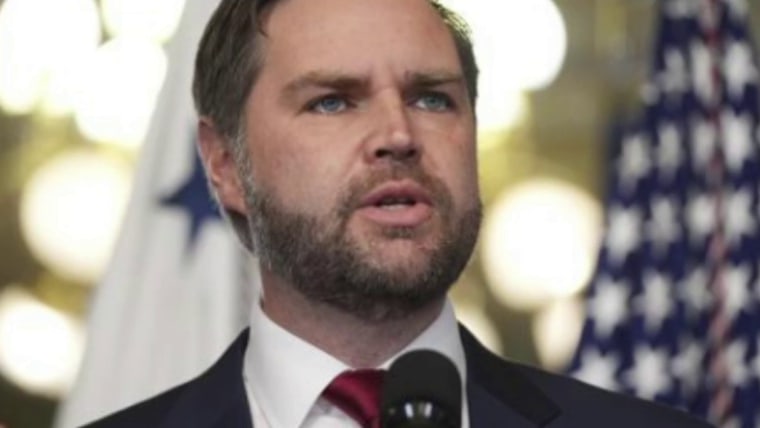
Officials in the state of Washington have agreed to water down a child abuse law after pressure from the Trump administration and local Catholic leaders.
Catholic bishops and the Trump administration had filed lawsuits seeking to overturn a bill signed by Washington Gov. Bob Ferguson, a Democrat and a Catholic, that required faith leaders of all denominations to report allegations of abuse they received in private religious settings — including confession. Though the Catholic Church has a documented history of enabling child sexual abuse, the sponsor of Washington’s bill said the legislation was inspired by reports of abuse within Jehovah’s Witness churches.
Catholic leaders have argued that being forced to report admissions made during a confession amounts to religious discrimination. And after a federal court temporarily blocked the law in July, Washington’s attorney general said late last week that the law will be pared back:
Clergy in Washington will remain mandatory reporters under stipulations filed today by the state Attorney General’s Office and the plaintiffs in lawsuits against the state over Senate Bill 5375. Under the stipulations, however, the state and county prosecutors have agreed — as the court ordered — not to enforce reporting requirements for information clergy learn solely through confession or its equivalent in other faiths. The stipulation now awaits approval by the court.
Most states have so-called clergy-penitent privilege laws that effectively shield religious leaders from having to report child abuse claims they hear in confessional settings. A 2022 report by Boston’s NPR station, WBUR, detailed how this loophole has protected churches from prosecutions and civil lawsuits from victims seeking accountability. Washington had sought to join the few other states without such protections.
In Washington, the governor had denounced the lawsuit filed by Catholic bishops in his state, with Ferguson saying that he was “disappointed my Church is filing a federal lawsuit to protect individuals who abuse kids.”
Jean Hill, executive director of the Washington State Catholic Conference, said in a statement last week that “preventing abuse and upholding the sacred seal of confession are not mutually exclusive — we can and must do both.”
The Dictatorship
Trump administration eyes higher food prices as a result of the immigration crackdown

About a month after Election Day 2024, as Donald Trump prepared to return to the White House, the Republican appeared on “Meet the Press” and explained his victory to NBC News’ Kristen Welker.
“I won on groceries,” he saidadding: “I won an election based on that.” Looking ahead, Trump concludedin reference to food prices for consumers: “We’re going to bring those prices way down.”
After returning to power, the president began boasting about his successes on the issue, assuring Americans that he had lowered the cost of groceries — despite the administration’s own data, which shows grocery costs have gone up this year, not down.
Complicating matters, the president’s own team fears that the problem will soon get worse, as a direct result of the Republican White House’s own agenda. The Washington Post reported:
The Trump administration said that its immigration crackdown is hurting farmers and risking higher food prices for Americans by cutting off agriculture’s labor supply. The Labor Department warned in an obscure document filed with the Federal Register last week that ‘the near total cessation of the inflow of illegal aliens’ is threatening ‘the stability of domestic food production and prices for U.S. consumers.’
According to the Labor Department’s assessment, which was first reported by The American Prospectthe administration needs to act “immediately” to prevent the problem from getting worse.
The Post’s report noted that Agriculture Secretary Brooke Rollins has predicted that, in the aftermath of Trump’s mass deportation agenda, the U.S. farm workforce will become “100% American.” Trump’s Labor Department doesn’t see that as realistic, since Americans lack the will and skills to replace migrant farmworkers.
“The Department concludes that qualified and eligible U.S. workers will not make themselves available in sufficient numbers,” the agency said.
In other words, the president who claimed that he won a second term based on food prices, and who vowed to bring consumer costs at grocery stores “way down,” is already lying about his recent record. But making matters even worse is the fact that his own administration expects the problem to get worse, as food production slows as a result of the White House’s campaign against immigrants, which is likely to reduce supply, pushing prices up.
At that point, Trump will have to choose between competing campaign promises: Will he let immigrants stay and help stabilize food costs, or will he deport these workers and risk the fury of consumers who’ll see prices at their local grocery store climb?
Steve Benen is a producer for “The Rachel Maddow Show,” the editor of MaddowBlog and an BLN political contributor. He’s also the bestselling author of “Ministry of Truth: Democracy, Reality, and the Republicans’ War on the Recent Past.”
-
Uncategorized11 months ago
Bob Good to step down as Freedom Caucus chair this week
-

 Politics8 months ago
Politics8 months agoFormer ‘Squad’ members launching ‘Bowman and Bush’ YouTube show
-

 The Josh Fourrier Show11 months ago
The Josh Fourrier Show11 months agoDOOMSDAY: Trump won, now what?
-

 The Dictatorship8 months ago
The Dictatorship8 months agoPete Hegseth’s tenure at the Pentagon goes from bad to worse
-

 The Dictatorship8 months ago
The Dictatorship8 months agoLuigi Mangione acknowledges public support in first official statement since arrest
-

 Politics8 months ago
Politics8 months agoBlue Light News’s Editorial Director Ryan Hutchins speaks at Blue Light News’s 2025 Governors Summit
-

 Politics11 months ago
Politics11 months agoWhat 7 political experts will be watching at Tuesday’s debate
-

 Politics8 months ago
Politics8 months agoFormer Kentucky AG Daniel Cameron launches Senate bid




